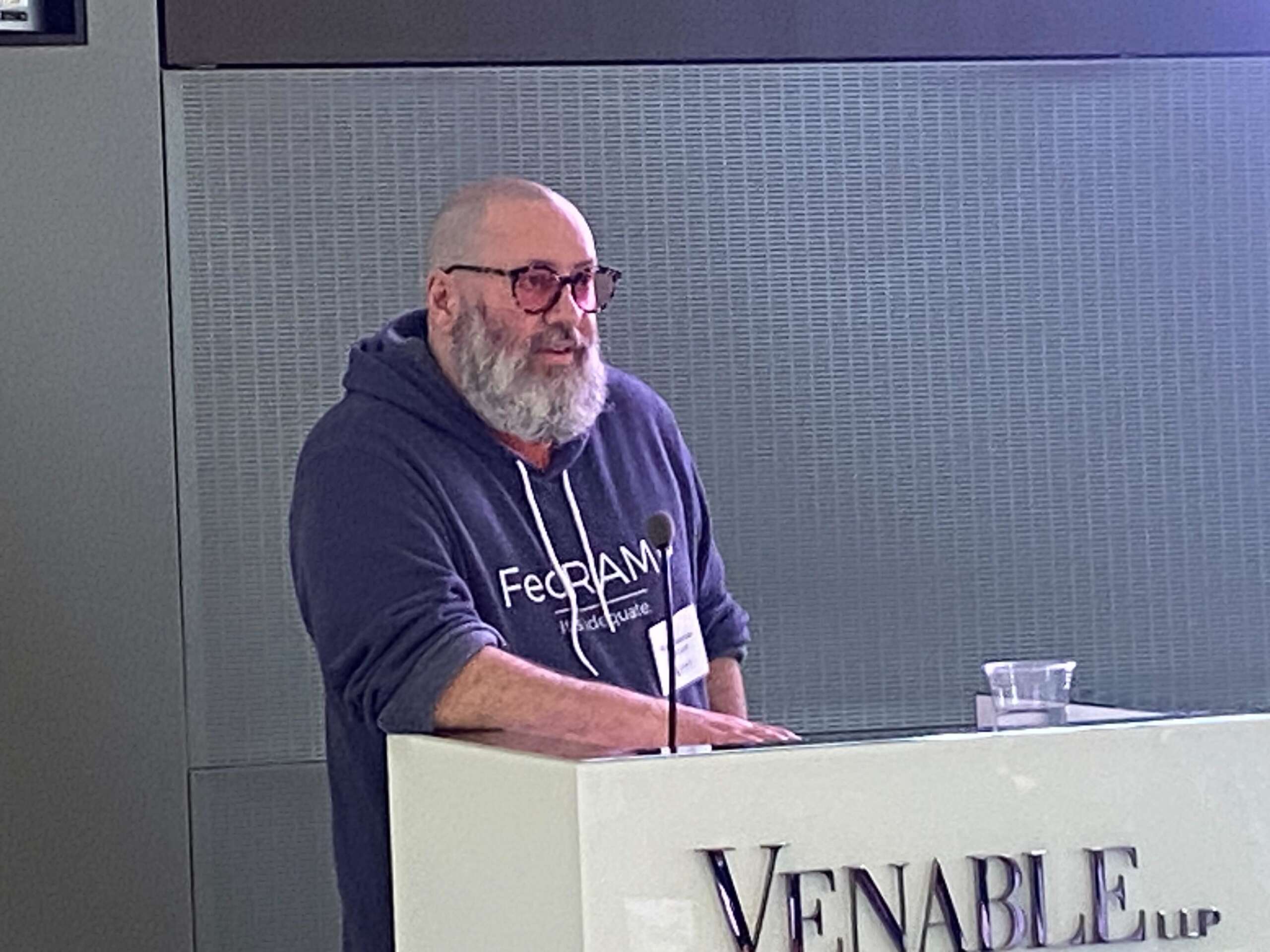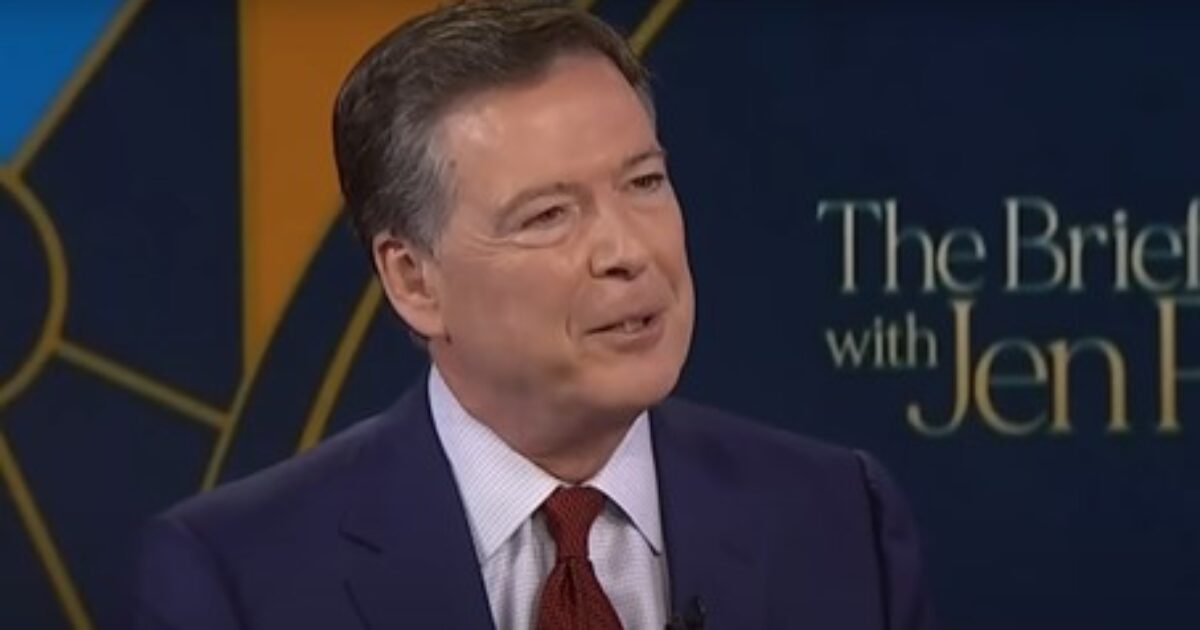Politics
FedRAMP 20x pilots finds initial success with four approvals

The initial results are in four months into the pilot effort to improve the cloud security program known as FedRAMP.
Four vendors have crossed the finish line to receive low authorizations under FedRAMP, proving the faster review process is working.
Pete Waterman, the director of the FedRAMP program, said the goal of 20x is to make the authorization process better, faster and cheaper.
Pete Waterman, the director of FedRAMP, speaks at the Alliance for Digital Innovation event in March. (Jason Miller/FNN)
“The learning is this has worked out really exactly like we dreamed, almost more than we dreamed. What we have found is that the proof of concept works. You can use automated capabilities to validate some fair majority of real security decisions and controls, and you can do that via first party and via third party tools, which is really awesome,” Waterman said after his speech at the 930Gov conference sponsored by the Digital Government Institute last Thursday. “As we go through this, we’re trending in on things that we need to tweak to make this a real authorization. That’s obviously the point of the pilot.”
The first four vendors reached authorization within the first month of the pilot.
The FedRAMP program management office will continue to accept phase one pilot 20x applications through Aug. 19. Waterman said there are about 14 cloud services packages already in the queue under this pilot and he expects several more to come in over the next few weeks. FedRAMP kicked off the programmatic overhaul in March with an appeal for more industry input and a goal of reducing the burden of achieving authorization.
“We’re going to be taking a lot of time at the end of August and September to really circle around with what we’ve learned, talk to these folks and make some determinations from there,” he said. “The core difference that we’re seeing is in the approach to validation. So right now, we’ve seen everything from ‘I ran this one time, and that like proved that I was right,’ all the way to, ‘I am running this constantly, every couple of hours, and it has proven that we’re right.’ That’s where we’ve seen the biggest amount of variance. As far as coverage goes, it’s been really high, definitely, typically, more than 80%. I just saw a demo a couple of weeks ago where we saw a lifecycle management where there was a validation that a change was made in the infrastructure and it tracks it all the way back to a ticket that was created to make that change and verified that the three people with the correct approval permission actually approved that ticket. You see this whole lifecycle happening in a moment in a way that you can’t get any other way.”
The initial successes of the 20x pilot comes about a year after the Office of Management and Budget updated the policy governing FedRAMP to address long-standing challenges with the cloud security program.
Waterman said the program really hit its stride in the last six months.
An automation forward process
He said FedRAMP is an entirely different program than the one that existed a year ago because of the way the expectations, the vision, the strategy, the responsibilities, the authority all changed based on the that new memorandum.
Last year FedRAMP had approved less than 350 cloud services in 10 years, built a backlog of more than 75 agency authorized services waiting for FedRAMP review, and averaged under 50 authorizations per year for the last five years.
Over the last year, and really in the last six months, FedRAMP has authorized more than 100 cloud services. The average agency authorization review queue remains under 15 cloud services with a typical review time of under five weeks.
“The new administration came in beginning of January and basically just said, ‘We don’t want you to navigate that anymore. We’d like you to just do all of the new, important stuff that you’re supposed to do and stop trying to carry this weird legacy stuff.’ So that led us to deeply, deeply focus on rethinking the process, to lean into that authority under the law, to develop, create and implement a process. That’s what we’ve been doing with FedRAMP 20x where the law and [OMB memo] required us to build an automation forward process,” Waterman said. “After many, many years of a lot of brilliant folks in private sector trying to figure out how to automate the existing process without much success, we decided to go at it with a different direction. 20x is designed to be a cloud native security assessment process that focuses on legitimate security outcomes that can be reviewed based on the actual configurations that you make while using a technology service, rather than the old process, which was based on narratives.”
The idea is for vendors to show how they are protecting data or their systems instead of telling it through a 300-400 page document. Waterman said, for example, the vendor’s cloud service provider can demonstrate that the data is encrypted through automated processes.
He said the idea driving 20x is not self-attestation, but validating configuration settings and getting to the ground truth.
“in the old way, you’ve got a 300-400 page document with a whole bunch of stuff, you have to pay someone to come in and look at it and do an analysis, and humans talk. It’s human, human, human, human, human, human, human,” he said. “In the 20x model, if you’re deployed on a FedRAMP authorized infrastructure like Amazon Web Services or Google cloud platform, you’ll be able to just press a button and get a report that says you’ve met 80% of the requirements. There’s a bunch of other things that you need to reconfigure, but the speed, the cost and the incentive is just totally different in that world.”
Comments due on vulnerability management standards
Once the program office is comfortable with the 20x process for low authorizations, Waterman said he expects to begin pilots for moderate level authorization this fall and the move to high authorizations in early 2026.
“Once we get to high, then we start all the way back down at low. Now it’s you’ve got your own data centers and you’ve got your own buildings, here’s how to get low in there, and we just keep adding on. So like true incremental delivery is what we’re looking for in that process,” he said. “When we think about the transformation that is going to happen in FedRAMP, it’s not going to be two years of waiting and then a switch flips and all of a sudden everything’s different. Instead, it’s going to be every couple of weeks, every month, there’s a little bit of a change, and then three years from now, you look back and see — oh, we got everything right.”
Along with the 20x pilots, FedRAMP released a request for comments on vulnerability management standards. The standard helps explain how cloud services should handle security risks with the goal of providing future guidance on having a clear, consistent approach to identifying and addressing vulnerabilities.
Waterman said the new standards are how FedRAMP is shifting to being a security based program rather than a compliance based program.
“This is a standard doesn’t say here’s what you have to meet in order to be good enough, but rather, it’s a standard that says here’s what we’re going to expect people to start shifting toward in order to improve their security over time,” he said. “So what we’re really looking for, from a public comment standpoint, is understanding what the impacts of those shifts will be, how realistic it is for different sized companies and different people to do it and where we match against private sector best practices. We had a vulnerability management special event hosted [July 30] and one of the consistent narratives from a lot of technology companies is that we go way above and beyond the requirements right now for FedRAMP, and these new requirements are actually starting get closer to what we do for our commercial customers. That’s the kind of feedback that helps us know that we’re going in the right direction, that we’re building something that makes sense for businesses and for government.”
Comments are due Aug. 21. Waterman said depending on the comments, the program management office may finalize the standards in a matter of weeks — or it may take a few months.
The post FedRAMP 20x pilots finds initial success with four approvals first appeared on Federal News Network.
Politics
President Trump Taps Dr. Ben Carson for New Role — A HUGE Win for America First Agenda

Dr. Ben Carson is the newest member of the Trump administration.
On Wednesday, former Secretary of the Department of Housing and Urban Development, Ben Carson, was sworn in as the national adviser for nutrition, health, and housing at the U.S. Department of Agriculture.
Agriculture Secretary Brooke Rollins shared that Carson’s role will be to oversee Trump’s new Big Beautiful Bill law, which aims to ensure Americans’ quality of life, from nutrition to stable housing.
After being sworn in, Carson shared, “Today, too many Americans are suffering from the effects of poor nutrition. Through common-sense policymaking, we have an opportunity to give our most vulnerable families the tools they need to flourish.”
WATCH:
BREAKING Dr. Ben Carson has been sworn in as the National Nutrition Advisor to Make America Healthy Again
THIS IS A HUGE WIN pic.twitter.com/Dr5AsSDkRM
— MAGA Voice (@MAGAVoice) September 24, 2025
Per USDA:
Today, U.S. Secretary of Agriculture Brooke L. Rollins announced that Dr. Benjamin S. Carson, Sr., M.D., was sworn in as the National Advisor for Nutrition, Health, and Housing at the U.S. Department of Agriculture (USDA).
“There is no one more qualified than Dr. Carson to advise on policies that improve Americans’ everyday quality of life, from nutrition to healthcare quality to ensuring families have access to safe and stable housing,” said Secretary Rollins.
“With six in ten Americans living with at least one chronic disease, and rural communities facing unique challenges with respect to adequate housing, Dr. Carson’s insight and experience is critical. Dr. Carson will be crucial to implementing the rural health investment provisions of the One Big Beautiful Bill and advise on America First polices related to nutrition, health, and housing.
“As the U.S. Secretary of Housing and Urban Development in the first Trump Administration, Dr. Carson worked to expand opportunity and strengthen communities, and we are honored to welcome him to the second Trump Administration to help lead our efforts here at USDA to Make America Healthy Again and ensure rural America continues to prosper.”
“Today, too many Americans are suffering from the effects of poor nutrition. Through common-sense policymaking, we have an opportunity to give our most vulnerable families the tools they need to flourish,” said Dr. Ben Carson. “I am honored to work with Secretary Rollins on these important initiatives to help fulfill President Trump’s vision for a healthier, stronger America.”
On Sunday, Dr. Carson was one of the many speakers at the memorial service of the late TPUSA founder Charlie Kirk.
During the memorial service, Carson highlighted that Kirk was shot at 12:24 p.m. and then continued to share the Bible verse John 12:24, which reads, “Verily, verily, I say unto you, Except a corn of wheat fall into the ground and die, it abideth alone: but if it die, it bringeth forth much fruit.”
WATCH:
Ben Carson reads John 12:24 at the Charlie Kirk’s funeral. Charlie was shot at 12:24.
It reads: “Very truly I tell you, unless a kernel of wheat falls to the ground and dies, it remains only a single seed. But if it dies, it produces many seeds”
God is moving and speaking. pic.twitter.com/0ZbVTAwwYl
— Danny Botta (@danny_botta) September 21, 2025
The post President Trump Taps Dr. Ben Carson for New Role — A HUGE Win for America First Agenda appeared first on The Gateway Pundit.
Politics
LEAKED MEMO: Deep State Prosecutors in the Eastern District of Virginia Claim There Isn’t Enough Evidence to Convict Comey Amid Reports of Imminent Indictment


On Wednesday evening, disgruntled officials in the Eastern District of Virginia leaked contents of a memo explaining why charges should not be brought against James Comey.
As reported earlier, former FBI Director James Comey is expected to be indicted in the Eastern District of Virginia in the next few days.
Comey will reportedly be charged for lying to Congress in a 2020 testimony about whether he authorized leaks to the media.
Officials in the Eastern District of Virginia are still fighting to stop Comey from being charged after Trump fired US Attorney Erik Siebert.
President Trump last week fired Erik Siebert as the US Attorney for the Eastern District of Virginia because he refused to bring charges against Letitia James, Comey, Schiff and others.
On Saturday evening, President Trump announced that he had appointed Lindsey Halligan – his personal attorney who defended him against the Mar-a-Lago raid – as US Attorney for the Eastern District of Virginia.
Now, with just days to go before the statute of limitations runs out to charge Comey for lying during a September 30, 2020 testimony, Lindsey Halligan is reportedly gearing up to indict Comey.
Prosecutors reportedly gave newly sworn-in Halligan a memo defending James Comey and explaining why charges should not brought against the fired FBI Director.
Per MSNBC’s Ken Dilanian:
Two sources familiar with the matter tell me prosecutors in the EDVA US attorney‘s office presented newly sworn US attorney Lindsey Halligan with a memo explaining why charges should not be brought against James Comey, because there isn’t enough evidence to establish probable cause a crime was committed, let alone enough to convince a jury to convict him.
Justice Department guidelines say a case should not be brought unless prosecutors believe it’s more likely than not that they can win a conviction beyond a reasonable doubt.
Two sources familiar with the matter tell me prosecutors in the EDVA US attorney‘s office presented newly sworn US attorney Lindsey Halligan with a memo explaining why charges should not be brought against James Comey, because there isn’t enough evidence to establish probable…
— Ken Dilanian (@DilanianMSNBC) September 24, 2025
The post LEAKED MEMO: Deep State Prosecutors in the Eastern District of Virginia Claim There Isn’t Enough Evidence to Convict Comey Amid Reports of Imminent Indictment appeared first on The Gateway Pundit.
Politics
Nearly 8 in 10 Voters Say the United States is in Political Crisis After the Assassination of Charlie Kirk

Nearly eight in ten voters believe that the United States is in a political crisis in the wake of the assassination of conservative icon Charlie Kirk.
According to a Quinnipiac University national poll of registered voters released on Wednesday, a massive 93 percent of Democrats, 84 percent of independents, and 60 percent of Republicans said the nation is in a political crisis.
“The Kirk assassination lays bare raw, bipartisan concerns about where the country is headed,” Quinnipiac University Polling Analyst Tim Malloy said of the poll results.
Quinnipiac reports:
Seventy-one percent of voters think politically motivated violence in the United States today is a very serious problem, 22 percent think it is a somewhat serious problem, 3 percent think it is a not so serious problem, and 1 percent think it is not a problem at all.
This is a jump from Quinnipiac University’s June 26 poll when 54 percent thought politically motivated violence in the United States today was a very serious problem, 37 percent thought it was a somewhat serious problem, 6 percent thought it was a not so serious problem, and 2 percent thought it was not a problem at all.
Nearly 6 in 10 voters (58 percent) think it will not be possible to lower the temperature on political rhetoric and speech in the United States, while 34 percent think it will be possible.
Over half, 54 percent, of voters believe the US will see increased political violence over the next few years. Another 27 percent said they think it will stay “about the same,” while just 14 percent believe it will ease.
A 53 percent majority also said they are “pessimistic about freedom of speech being protected in the United States.”
Surprisingly, a 53 percent majority also believes the current system of democracy is not working.
“From a perceived assault on freedom of speech to the fragility of the democracy, a shudder of concern and pessimism rattles a broad swath of the electorate. Nearly 80 percent of registered voters feel they are witnessing a political crisis, seven in ten say political violence is a very serious problem, and a majority say this discord won’t go away anytime soon,” Malloy added.
The vast majority, 82 percent, said the way that people discuss politics is contributing to the violence.
“When asked if political discourse is contributing to violence, a rare meeting of the minds…Republicans, Democrats, and independents in equal numbers say yes, it is,” Malloy said.
The survey was conducted from September 18 to 21 among 1,276 registered voters with a margin of error of +/- 3.3 percentage points.
The post Nearly 8 in 10 Voters Say the United States is in Political Crisis After the Assassination of Charlie Kirk appeared first on The Gateway Pundit.
-

 Entertainment6 months ago
Entertainment6 months agoNew Kid and Family Movies in 2025: Calendar of Release Dates (Updating)
-

 Entertainment3 months ago
Entertainment3 months agoBrooklyn Mirage Has Been Quietly Co-Managed by Hedge Fund Manager Axar Capital Amid Reopening Drama
-
Tech6 months ago
The best sexting apps in 2025
-

 Entertainment5 months ago
Entertainment5 months agoKid and Family TV Shows in 2025: New Series & Season Premiere Dates (Updating)
-

 Tech7 months ago
Tech7 months agoEvery potential TikTok buyer we know about
-
Tech7 months ago
iOS 18.4 developer beta released — heres what you can expect
-

 Tech7 months ago
Tech7 months agoAre You an RSSMasher?
-

 Politics7 months ago
Politics7 months agoDOGE-ing toward the best Department of Defense ever





